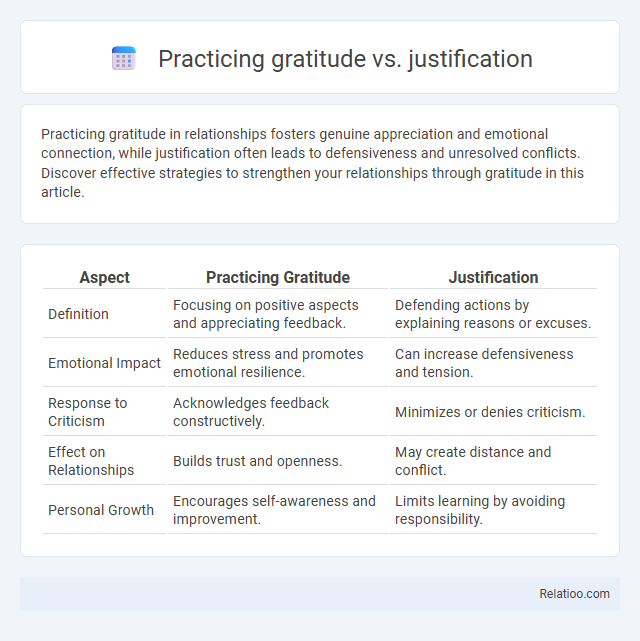Practicing gratitude in relationships fosters genuine appreciation and emotional connection, while justification often leads to defensiveness and unresolved conflicts. Discover effective strategies to strengthen your relationships through gratitude in this article.
Table of Comparison
| Aspect | Practicing Gratitude | Justification |
|---|---|---|
| Definition | Focusing on positive aspects and appreciating feedback. | Defending actions by explaining reasons or excuses. |
| Emotional Impact | Reduces stress and promotes emotional resilience. | Can increase defensiveness and tension. |
| Response to Criticism | Acknowledges feedback constructively. | Minimizes or denies criticism. |
| Effect on Relationships | Builds trust and openness. | May create distance and conflict. |
| Personal Growth | Encourages self-awareness and improvement. | Limits learning by avoiding responsibility. |
Understanding Gratitude: More Than Just Being Thankful
Understanding gratitude involves recognizing it as an active practice that deepens emotional well-being beyond merely feeling thankful. Practicing gratitude requires intentional reflection on positive experiences and acknowledging the impact of others, fostering empathy and resilience. Unlike justification, which rationalizes actions or feelings, gratitude centers on appreciation without conditions, promoting mental and physical health benefits supported by psychological research.
The Psychology Behind Practicing Gratitude
Practicing gratitude enhances psychological well-being by promoting positive emotions, reducing stress, and fostering resilience through increased activation of brain areas linked to reward and empathy. Justification, in contrast, often centers on defending actions or beliefs, which can reinforce negative emotions or cognitive biases, limiting emotional growth. When you embrace gratitude, your mental health benefits from improved mood regulation and stronger social connections, supporting overall psychological resilience.
Defining Justification: Making Excuses or Seeking Reason?
Justification involves providing reasons or excuses to defend actions or decisions, often to avoid responsibility or guilt. Practicing gratitude centers on recognizing and appreciating positive aspects of life, fostering a mindset of thankfulness without the need for excuses. Unlike justification, which can create barriers to personal growth, gratitude encourages acceptance and promotes emotional well-being.
How Gratitude Shapes Mindset and Behavior
Practicing gratitude cultivates a positive mindset by encouraging focus on abundance and appreciation, which enhances emotional resilience and overall well-being. Justification often centers on rationalizing actions or feelings, potentially fostering defensiveness rather than growth. Consistent gratitude practice reshapes behavior by promoting empathy, increasing motivation, and reinforcing constructive social interactions, whereas justification may impede these adaptive changes.
The Pitfalls of Relying on Justification
Relying on justification often leads to rationalizing negative experiences instead of genuinely appreciating positive aspects, which undermines the true practice of gratitude. Practicing gratitude shifts your focus towards recognizing and valuing meaningful moments, fostering emotional resilience and well-being. Your mindset transforms when gratitude replaces justification, promoting a healthier perspective grounded in acceptance rather than defensiveness.
Comparing the Impacts: Gratitude vs Justification
Practicing gratitude enhances emotional well-being by fostering positive emotions, reducing stress, and improving relationships, whereas justification often reinforces negative thought patterns and self-rationalization, limiting personal growth. Gratitude activates neural pathways linked to reward and social bonding, promoting resilience and prosocial behavior, while justification triggers cognitive biases that can hinder accountability and perpetuate conflict. Empirical studies reveal that individuals engaging in regular gratitude practices report higher life satisfaction compared to those who habitually justify actions, highlighting gratitude's superior impact on psychological health.
Emotional Benefits of Embracing Gratitude
Practicing gratitude fosters emotional resilience by enhancing your overall well-being and reducing negative emotions such as envy and resentment. Unlike justification, which tends to rationalize or excuse situations, embracing gratitude shifts your focus towards positive aspects, promoting a mindset of appreciation and contentment. The emotional benefits of practicing gratitude include increased happiness, deeper social connections, and improved mental health, making it a powerful tool for emotional growth.
The Cycle of Justification: Hindering Personal Growth
The cycle of justification often traps individuals in rationalizing their actions or feelings instead of embracing genuine change, which hinders personal growth. Practicing gratitude shifts focus from self-justification to acknowledging positive aspects in Your life, fostering resilience and emotional well-being. By consistently cultivating gratitude, You break free from the limiting cycle of justification, unlocking opportunities for meaningful development and happiness.
Practical Ways to Cultivate a Gratitude Practice
Practicing gratitude involves intentionally recognizing and appreciating the positive aspects of your life, fostering a mindset of thankfulness that enhances emotional well-being. Unlike justification, which rationalizes situations to defend or excuse outcomes, gratitude centers on acknowledging value and blessings without needing explanations. Your practical ways to cultivate a gratitude practice include keeping a daily gratitude journal, expressing thanks to others, and reflecting on positive experiences during meditation or quiet moments.
Transforming Mindsets: Choosing Gratitude Over Justification
Transforming mindsets by choosing gratitude over justification fosters a positive cognitive shift that enhances emotional resilience and interpersonal relationships. Practicing gratitude rewires neural pathways to focus on abundance and appreciation, while justification often reinforces defensiveness and victimhood. Emphasizing gratitude cultivates mindfulness and reduces stress, promoting a healthier mental outlook that supports personal growth and well-being.

Infographic: Practicing gratitude vs Justification
 relatioo.com
relatioo.com